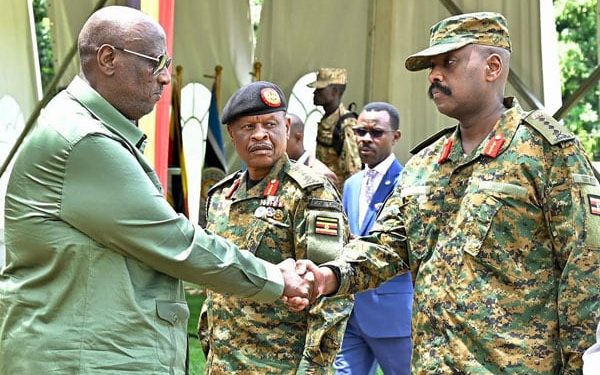KAMPALA, Uganda — Gen. Muhoozi Kainerugaba, Uganda’s Chief of Defence Forces, has publicly apologized to his uncle, Gen. Salim Saleh, and pledged to stop his verbal attacks on European diplomats.
The apology follows a behind-the-scenes intervention by Gen. Saleh during a private meeting with European Union envoys in Gulu.
Muhoozi shared a conciliatory message on his X platform Monday.
“Out of respect for my great uncle, Afande Saleh, I shall not mention Germany or bazungu again. I want to apologize to Afande Saleh if I disobeyed him in any way. Nisamehe Afande,” he wrote, using a Swahili word for “forgive me.”
Muhoozi’s apology came after a diplomatic uproar sparked by his earlier social media statements. He had accused German Ambassador Matthias Schauer and other European diplomats of interfering in Uganda’s internal affairs and aligning with opposition forces.
His remarks triggered formal protests from several diplomatic missions and prompted the EU delegation to seek clarification from the Ugandan government.
Gen. Saleh, who hosted the EU officials last week, reportedly played a central role in de-escalating tensions. He assured diplomats of Uganda’s respect for diplomatic norms and pledged to “tame” his nephew’s conduct.
During what sources described as a tense meeting, Gen. Saleh took the unusual step of apologizing to the EU delegation on behalf of Muhoozi. The gesture was seen as an attempt to restore trust and avoid further fallout.
The controversy extended beyond European capitals. Muhoozi’s online tirades drew concern from regional neighbors, with both the Democratic Republic of Congo and Sudan filing formal complaints about what they viewed as inflammatory rhetoric.
Amid the storm, the Uganda People’s Defence Forces (UPDF) added fuel to the fire with a defiant X post Sunday, declaring that Uganda had “cut all military ties” with Germany. The announcement escalated the diplomatic standoff and strained Uganda’s relationship with Berlin.
Muhoozi’s decision to retract his statements is widely attributed to Saleh’s intervention, which appears to have been calculated to ease international tensions during a sensitive period for Uganda’s foreign policy and domestic political environment.


















